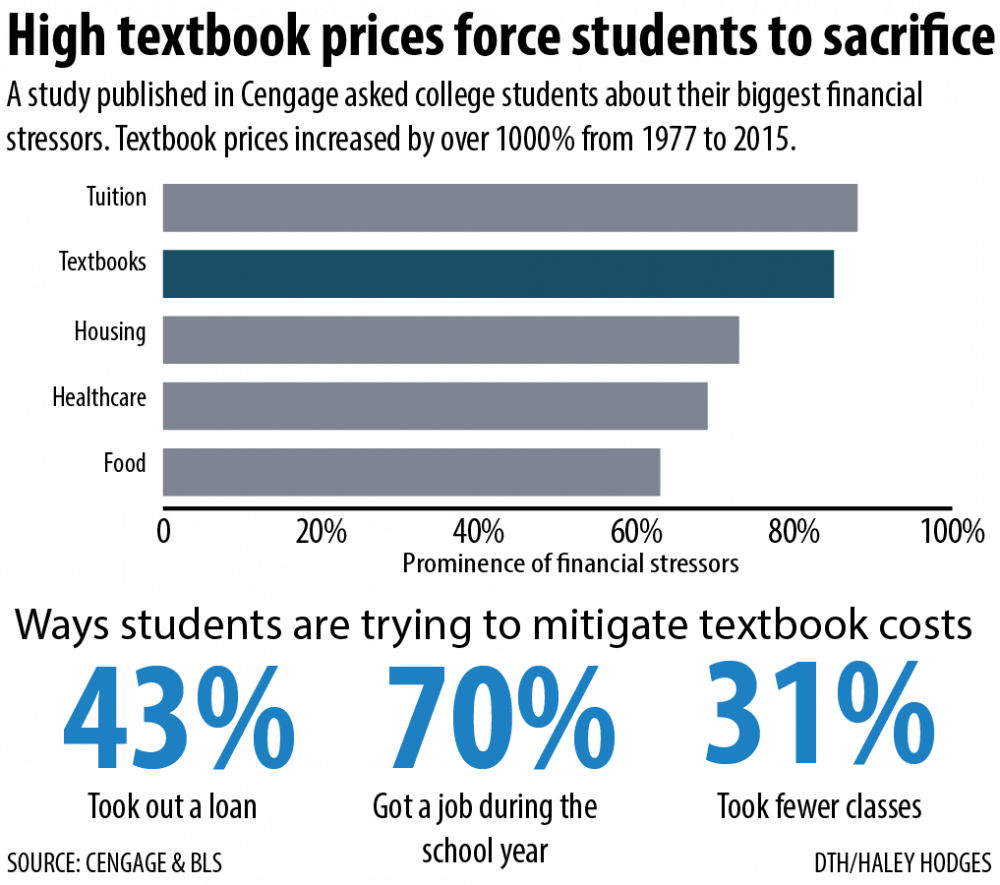“They weren’t all utilized by my professors and I was like, well if this is a $500 or $600 expense that I can’t really afford, then I’m not going to continue buying them if they’re not guaranteed to be used,” she said.
Doggett either rents textbooks, buys them used, splits the cost with a friend or, if the library carries her textbook, she’ll make trips to the library to do her readings.
Besides textbooks, some classes also require online access codes for homework materials. Mark Goldbach, a senior journalism major, had experience with this.
“I think the one thing that really doesn’t have an alternative is access codes,” Goldbach said. “I’m in a science lab right now where we have to buy a $70 access code just to submit homework. For students that are buying a bunch of books for other classes, on top of that, they have to buy access codes to even hope to get a decent grade.”
Goldbach primarily rents or buys used books from Amazon or Chegg, since he has found their prices are often lower than those in the UNC Student Stores. He said he did not know whether student stores did price matching.
Michele Gretch Carter, the director of student stores, said the bookstore actually does offer price matching. Their rental program, used books and course packs also save students a lot of money, she said. New books are discounted at 10 percent lower than the industry bookstore price before they’re put on the shelf.
Gretch Carter said the bookstore started a new program this year to offer students cheaper courseware packages — online textbooks, quizzes, homework and other interactive materials — so students can access the required digital material on the first day of class.
“A lot of students hold out as long as they can without the materials, but they sacrifice their ability in class,” she said. “We’ve worked with some of the major publishers, and what we’re providing is under-market value for digital delivery. We did a pilot for that with five courses this semester and saved students over $33,000.”
Markson said in the past few years, publishers have often raised prices to compensate for fewer students buying new textbooks. Cengage now offers a new alternative for students.
The company launched Cengage Unlimited in August, a subscription service that offers unlimited access to more than 20,000 digital course materials for one price of $119.99 a semester or $179.99 a year.
Markson said students can pay anything from $600 to $1,200 for textbooks a year, so the subscription could save them a lot of money if even one of their courses requires Cengage materials.
Even with all her strategies, sometimes Doggett still cannot avoid unexpected costs of course materials. In her"Introduction to Digital Storytelling" course in UNC's School of Media and Journalism, she was informed on the first day of class that she would have to purchase an expensive external hard drive, domain for a website and SD card. The course did not require a textbook.
To get the day's news and headlines in your inbox each morning, sign up for our email newsletters.
“A lot of times professors wait until the last minute to post their syllabi on the Sakai site, so there’s the additional stress of — you’re being given this requirement to pay for something that’s very last minute, when you don’t have time to really plan for it or to budget for it or save up for it,” Doggett said.
Niklaus Steiner, a professor in the global studies department and director of the Center of Global Initiatives, used to require his own textbook for his course, "International Migration and Citizenship Today," because he couldn’t find another book to cover his material.
He said he had no power in setting the price and earned very little in royalties, but profit was never his goal. He chose to stop requiring the book last year.
“I felt once the book got a little dated, I didn’t feel right charging students anymore for it,” Steiner said.
Now, he scans documents and posts them on Sakai so students don’t have to pay for an unnecessary book.
Doggett said she thinks professors do not explore enough alternative routes, like scanning a textbook and posting it online.
“I don’t think that professors are intentionally not cognizant, but I think they could do a better job,” she said. “I think there are other ways in order for them to disseminate textbook information or academic information in a way that isn’t aligned with students having to pay over $60 per class.”
university@dailytarheel.com




